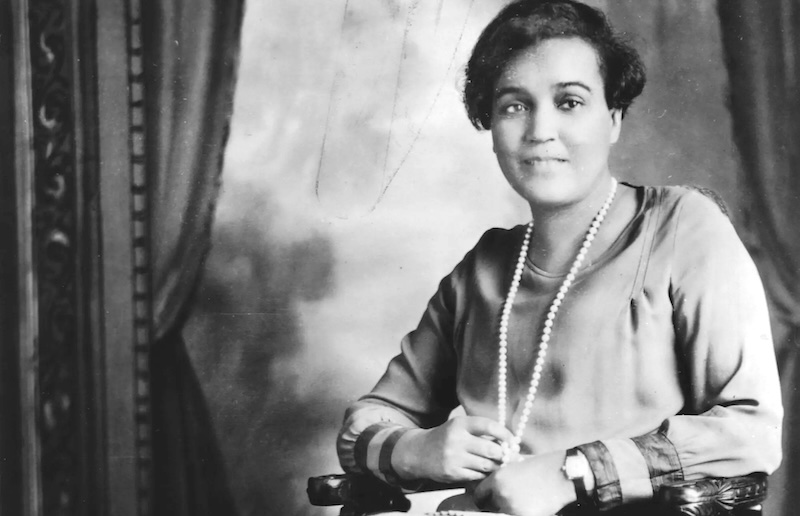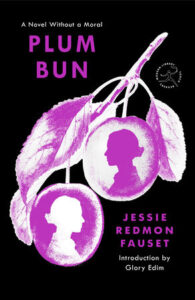
Glory Edim on Jessie Redmon Fauset’s Remarkable—and Forgotten—Plum Bun
Remembering the Work of “The Crisis” Editor and Harlem Renaissance Writer
Before the Harlem Renaissance had a name, Jessie Redmon Fauset was already drafting its blueprint—curating its voices, refining its vision, and authoring novels that quietly destabilized the racial and gendered hierarchies of American letters. Fauset’s brilliance and keen editorial eye played a pivotal role in shaping The Crisis, the official magazine of the NAACP, where she was an editor from 1919 to 1926.
During her tenure, she published authors such as Langston Hughes, Jean Toomer, and Countee Cullen—Black literary forefathers. She recognized their brilliance before the world did, offering them a platform at a time when publishing opportunities for Black writers were scarce. In his memoir The Big Sea, Langston Hughes wrote, “Jessie Fauset at The Crisis, Charles Johnson at Opportunity, and Alain Locke in Washington were the three people who midwifed the so-called New Negro literature into being. Kind and critical—but not too critical for the young—they nursed us along until our books were born.”
“Midwifing” is still the perfect metaphor for her pivotal legacy. Yet Fauset’s contributions were not just about discovery; she actively shaped the discourse around Black literature—her intellectual foresight created the foundation of the Harlem Renaissance. Fauset’s work at The Crisis showcased a remarkable display of erudition, leaving me eager to learn about her own writing life. It was clear to me that her genius went beyond the title of editor. Jessie Redmon Fauset isn’t talked about nearly as much as she should be—and that has less to do with the quality of her work and more to do with how literary history has chosen to remember (and forget) certain voices. While contemporaries such as Nella Larsen and Zora Neale Hurston have become fixtures in conversations about the Harlem Renaissance, Fauset often gets left in the margins, despite being one of the era’s most influential figures.
While contemporaries such as Nella Larsen and Zora Neale Hurston have become fixtures in conversations about the Harlem Renaissance, Fauset often gets left in the margins.
Part of the reason is that her writing, which focused on colorism, the lives of the Black middle class, and the quiet struggles of Black women navigating a racist, classist society, wasn’t always seen as radical enough. Where Larsen explored modernist ambiguity and Hurston embraced folkloric Black expression, Fauset wrote in a more traditional style that some critics dismissed as too proper or assimilationist. But that criticism misses the point. Fauset was writing about people who were often invisible in literature: Black women trying to carve out space in worlds that didn’t want them. Fauset wrote about Black lives with grace and complexity.
And there’s another layer: Fauset wasn’t just a writer—she was a literary gatekeeper. As the editor of The Crisis, she launched the careers of Harlem Renaissance greats. But because she was doing so much behind-the-scenes work, her own brilliance got overshadowed. It’s a familiar story; too often Black women do the labor, shape the culture, but get written out of the spotlight. Reclaiming Fauset means not only reading her novels but also rethinking whom we’ve been taught to celebrate, and why.
Encountering Jessie Redmon Fauset’s Plum Bun: A Novel Without a Moral for the first time feels like uncovering a long-overlooked gem in the canon of early-twentieth-century African American literature. The novel makes a compelling case for why her work deserves more attention. At its core, Plum Bun is a story about passing, but unlike some of its counterparts, it takes a broader, more introspective approach. Angela Murray, the protagonist, doesn’t just pass as white for survival—she does so in pursuit of personal and artistic freedom. Her story isn’t only about race but also about gender, class, and the illusive nature of the American Dream.
Through Angela, Fauset crafts an incisive exploration of racial performance, autonomy, and the often punitive structures of desire. Unlike many passing narratives of the era, Plum Bun does not merely frame its protagonist’s choice as tragic or redemptive; instead, it offers a deeply textured portrayal of the negotiations required to navigate a world where whiteness is currency and Blackness is burdened with preordained limitations. What struck me most was the way Fauset navigates these intersecting identities with a quiet yet incisive brilliance. Our protagonist, Angela, is constantly outcast in friendships on account of her identity, until a new girl named Mary Hastings comes along and prefers her company to the other girls.
But when Mary finds out that Angela is Black, she is incensed. Angela, who never lied about her race—she just didn’t mention it—ponders: “This was a curious business, this colour. It was the one god apparently to whom you could sacrifice everything Mary Hastings could let it come between her and her friend.” Here, Angela illustrates the extent to which her freedom is an illusion under the tight constraints of race and gender. But she also exposes the generalized incoherence of race, referring to it as a “curious business” and sarcastically calling it “the one god.” She interrogates the oppressive force of whiteness and simultaneously shifts our focus onto its moral hypocrisy.
Plum Bun examines the structures that make passing feel like an escape, a necessity, a betrayal. At what cost do we alter ourselves to fit? How does the performance of identity fracture the soul? Fauset writes with an awareness of these everlasting tensions, making the novel feel surprisingly modern despite its 1928 publication date.
Plum Bun examines the structures that make passing feel like an escape, a necessity, a betrayal. At what cost do we alter ourselves to fit? How does the performance of identity fracture the soul?
Angela, a light-skinned Black woman, leaves her home in Philadelphia after the death of her parents and consciously chooses to hide her racial identity. By passing as white, she gains access to elite art institutions, romantic relationships, and social circles that would have otherwise been closed to her. But this choice forces her to sever ties with her family—especially her darker-skinned sister, Virginia—and live in constant fear of being discovered. Through Angela’s journey, Fauset deftly examines the psychological toll of assimilation: the alienation, the moral ambiguity, the quiet erasures that come with trying to fit into a world not made for you. The novel asks: What do you lose when you trade authenticity for acceptance? And is that loss ever truly worth it?
These questions remain deeply relevant to us today. We exist in an era still grappling with colorism, the fictions of racial purity, and the constrained possibilities of Black female ambition. Through Angela, Fauset illustrates that passing was not merely about race but also about the shifting and often contradictory demands of belonging. In this, Plum Bun is not merely a novel without a moral—it is a novel that renders morality itself as unstable, contingent, and, ultimately, a site of struggle.
Angela’s story offers no easy answers, but through her striving and her quiet despair, she invites us to consider the power of self-authorship. Her narrative is a quiet rebellion, an insistence that Black women’s inner lives are worthy of literature, study, and legacy. Ironically, Fauset’s work, often overshadowed by the towering figures of the Harlem Renaissance, is a quiet yet necessary revolution. Through reading Plum Bun, I began to see books not as isolated artifacts but as conversations stretching across time. Jessie Redmon Fauset refused to be bound by a single definition of Black womanhood. Her legacy is deeply intertwined with the mission of Well-Read Black Girl, a community dedicated to amplifying Black women’s voices in literature and offering space for readers to wrestle with complexity, to heal, and to find themselves on the page.
It is my hope that Well-Read Black Girl continues the work that Fauset began: that it creates space for a diverse range of Black stories, insisting that literature by and about Black women is essential, not peripheral. At a time when Black women were largely invisible in American letters, Fauset made them her driving force. Across all her novels, including Plum Bun and There Is Confusion, she illustrated the beauty and nuance of Black women’s lived experiences. Every book club meeting, every author talk, and every literary celebration hosted by Well-Read Black Girl acknowledges her profound impact. We honor her legacy and boldly proclaim Black women’s voices not just as contributors to literature but as its shining architects and vanguards.
It is my hope that Well-Read Black Girl continues the work that Fauset began: that it creates space for a diverse range of Black stories.
I believe Angela Murray is Fauset’s most enduring creation—a young Black woman in pursuit of her becoming at all costs. Beneath her bold choices lies a deeper tension between self-erasure and self-discovery. Angela is not merely a symbol of racial duality; she is a mirror held up to the complexities of identity, womanhood, and ambition. Through her journey, Fauset forces us to confront the pain of exclusion and the price of access in a world built on rigid lines of race and gender.
To engage with Jessie Redmon Fauset’s work today is to recognize her as a literary pioneer. She reminds us that writing, editing, and curating are all acts of resistance, and that the stories we uplift shape not only our understanding of the past but also our possibilities for the future. She understood, with unwavering clarity, that Black life was not a singular tale of dejection or survival, but a rich and varied narrative of ambition, love, and self-discovery. She wrote about the complexity of Black womanhood before the world was ready to embrace it. She did not wait for permission. Her stories were invitations—to see, to feel, to understand that Black life was expansive, that Black brilliance was undeniable.
Well-Read Black Girl expands her legacy by inviting young writers to claim their birthright to storytelling and by giving readers the tools to recognize their reflection in the literary canon. Fauset’s work echoes in the prolific pages of Toni Morrison, in the sharp wit of Zora Neale Hurston, in the fierce storytelling of Jesmyn Ward. It hums in the laughter of Black women gathered over books, in the sisterhood of Well-Read Black Girl, in every young writer who dares to place their truth on the page. Fauset’s legacy is not simply that she wrote—it is that she made space, and in doing so, she illuminated a truth we carry still: Black brilliance is not a moment. It is a lineage. It is a light that does not dim.
This is the power of reading Black women’s literature. This is the power of Plum Bun: A Novel Without a Moral.
________________________

Introduction copyright © 2025 by Glory Edim. From Plum Bun by Jessie Redmon Fauset. Published by The Modern Library, an imprint of Random House, a division of Penguin Random House LLC.
Glory Edim
Glory Edim is a literary tastemaker, entrepreneur, and advocate for diverse voices in literature. In 2015, she founded Well-Read Black Girl (WRBG), an online platform and book club dedicated to celebrating the works of Black women authors and creating a supportive online community for readers. Her efforts have earned her accolades such as the 2017 Innovator’s Award from the Los Angeles Times Book Prizes and the Madam C.J. Walker Award from the Hurston/Wright Foundation. As an author herself, Edim has contributed to the literary landscape with her memoir, Gather Me: A Memoir in Praise of the Books That Saved Me, and her bestselling anthologies Well-Read Black Girl and On Girlhood.



















